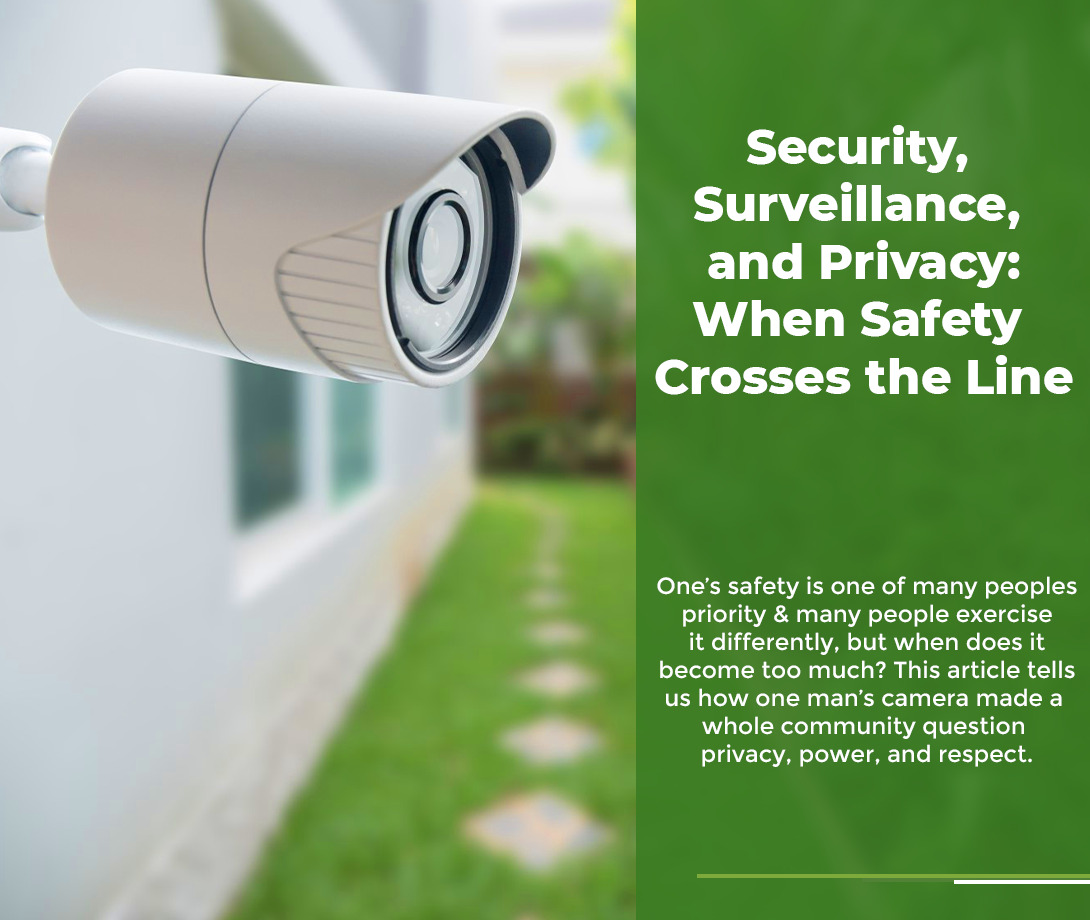How one man’s camera made people living in a community scheme question privacy, power, and respect.
CSOSlive Digest Editorial Team
(Estimated read time: 6–7 minutes)
The Story: The Camera in the Courtyard
In Oakbridge Villas, everyone cared about safety.
After a break-in at a nearby complex, Mr. Botha got worried. He was clever with gadgets, so he installed two high-tech cameras on his balcony — one facing the parking lot, and one pointing at the courtyard.
To him, it felt responsible.
To his neighbours, it felt like being watched.
Soon, Mrs. Pillay filed a complaint:
“The camera points at my patio and into my living room. I feel watched in my own home.”
The trustees asked Mr. Botha to adjust the cameras.
He refused.
“If you’re not doing anything wrong, why worry?”
And what began as one man’s “safety plan” turned into a fight about privacy, dignity, and the right to feel safe without being spied on.
So the matter moved to the Community Schemes Ombud Service (CSOS).
A simple balcony turned into a national debate:
When is security too much?
The Case at CSOS: Watching the Watchers
Case Reference: CSOS/GP/1130/25 (fictional, based on real cases)
The Complaint
Mrs. Pillay said her privacy was invaded. The cameras recorded her exclusive-use area and parts of her home without her consent.
The Defence
Mr. Botha argued that the cameras were only for protection, especially after the trustees failed to improve security.
The Ruling
The CSOS adjudicator ruled that the installation violated Section 13(1)(e) of the Sectional Titles Schemes Management Act (STSMA) and infringed on the privacy rights protected under the Protection of Personal Information Act (POPIA).
“While security is essential, it cannot be pursued at the cost of personal privacy. Schemes must adopt balanced policies that safeguard both.”
Orders Issued:
- The cameras were to be removed or repositioned within 14 days to prevent recording private areas.
- The body corporate was directed to adopt a comprehensive CCTV policy, including signage, consent procedures, and access protocols.
- Future installations required trustee and owner approval through a formal resolution.
The Human Side: When Safety Becomes Fear
Security is not just about cameras.
It’s about control.
It’s about feeling safe where you live.
For Mr. Botha, the cameras were comfort.
For Mrs. Pillay, they were violation.
The real issue wasn’t the camera — it was the trust that broke when no policy existed.
When trustees don’t guide, neighbours start doing their own thing.
A managing agent said it best:
“When people start filming each other, trust is already gone.”
Across South Africa, more cameras are being installed… but more residents are feeling watched. Not safer. Just watched.
This story asks a big question:
How do we stay safe without losing our dignity?
Lessons from the CSOS Ruling
| Lesson | What It Means |
| 1️. Consent Is Non-Negotiable | You can’t record people or their private areas without permission. |
| 2️.Trustees Must Lead | Make rules first — don’t panic later. |
| 3️. Privacy Still Matters in Shared Spaces | Common property doesn’t mean common surveillance. |
| 4️.Transparency Builds Trust | Signage, policies, and open communication calm fears. |
The Bigger Picture: South Africa’s Camera Boom
| Statistic | Insight |
| 62% | Of schemes now use CCTV (CSOS 2024) |
| 37% | Of disputes involve resident-installed cameras |
| 1 in 5 | Privacy cases report emotional distress |
| R70,000 | Average cost of camera disputes |
Trend:
Doorbell cams, drones, and access apps bring new risks — especially with POPIA privacy laws. Technology protects us only when we use it with consent.
What This Means for You
Trustees
- Write a Surveillance & Privacy Policy
- Follow POPIA when handling footage
- Approve camera zones and angles before installation
Residents
- You may not install cameras pointing at others or common property without permission
- Ask for your scheme’s CCTV policy
- Remember: safety without respect is not safety
Managing Agents
- Use standard CCTV policies for all schemes
- Train trustees on privacy and POPIA
- Audit cameras regularly for compliance
Final Reflection: The Eye in the Sky, the Heart on the Ground
Technology watches.
But trust protects.
A camera can see movement, but not intention.
It can warn us of danger, but it can’t teach us respect.
CSOS decisions remind us:
A safe community is one that feels respected, not just recorded.
Security should serve dignity — not replace it.
Because when cameras become walls instead of windows, even the safest complex starts to feel like a cage.
CSOS Digest Takeaway
| Principle | Description |
| Transparency | Declare and document surveillance openly |
| Governance | Use a written policy approved by owners |
| Empathy | Respect emotional discomfort as valid |
| Balance | Safety must protect privacy, not erase it |
About CSOSlive Digest
We tell the human stories behind South Africa’s community schemes.
We help trustees, owners, and managing agents build places where safety, fairness, and dignity live together.
For more information you can visit https://csos.org.za and https://www.csosconnect.org.za


